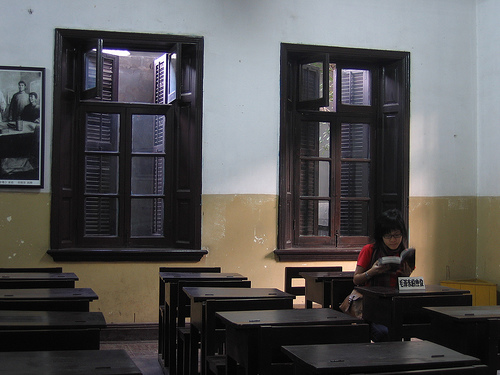As a teacher who understands and champions the benefits of using new media, social networking, or for lack of a better word- technology in the classroom, I think I often lose sight of what it is I am actually teaching. With recruiting season fast approaching, I have found myself immersed in the painstaking task of marketing myself.
While updating my resume, highlighting my innovative skills, or writing cover letters stressing my ability to be adaptive, collaborative, and visionary, I noticed how little I was talking about my love of the subject I teach- Language Arts.
It seems there is very little room in modern job recruitment for simply talking about why one chose to teach the subject of their expertise. Perhaps, I have gone about selling my career all wrong. Perhaps, administrators are not looking to see that their teachers are able to work in dynamic collaborative environments for the purpose of improving student learning. Maybe they just want to read why a certain teacher loves literature or science, or whatever the case may be. Perhaps, the only thing they would like to hear us discuss is how we can transfer our love of Steinbeck or Fitzgerald to students who are, more and more rapidly, becoming disengaged from the written word.
It is conceivable that after all the talk about our philosophies, skills, and technological know how, we as teachers should sit back and reflect upon what it is that we love about the subjects we teach everyday.
There is something indescribable about the feeling of sitting in a comfortable place, highlighter in hand, reading a great book. That feeling of kinship, understanding and bonding that is formed between author and reader is the epitome of social networking. We spend so much time and energy discovering new tools to help connect our students to information and to each other, that we sometimes forget that truly understanding a great piece of literature, having the ability to deconstruct, analyze, and synthesis text, and finally being able to produce a carefully crafted critique of a work can be just as effective of a skill to have as say blogging.
The poster children for how not to teach a class in the new age of technological pedagogy is the old chalk and talk, lecture from the podium, teacher as expert, been teaching Macbeth the same way for twenty years, thinks he or she is a professor, English teacher.
While I have spent much of my career, arguing that this style of top-down, teacher centered teaching is ineffective, lately I have been thinking that maybe simply teaching students how to read effectively is the most important thing we can do as Language Arts teachers. If our job is to teach literature then perhaps we need nothing more that the text. Everything else sometimes seems to be nothing more than a dog-and-pony show designed to keep students entertained, but not actually focused on the work.
I entered teaching because I wanted to help young people understand the world around them, in hopes that they would feel obliged to contribute to its fate. I chose to teach English because I see art in general, and literature in particular, as the greatest tool humankind has produced to help us connect and communicate with each other.
 Photo by nozomiiqel
Photo by nozomiiqel
Students may need to use blogs and other web based tools to share what they find, and connect with other students, but ultimately all they need is a good book and an inspirational teacher to guide them through it. Collaboration is great, but reading is often a very solitary act. Connection with a great piece of fiction needs only three things: author, reader, text. Everything else is secondary.
Reading over my resume and various cover letters, I am afraid that perhaps my devotion to technology is perhaps overshadowing my love of Language Arts. I am first and foremost a lover of books. My goal is to arouse this level of worship onto my students. I want students, parents, and administrators to know that I am not an IT teacher. I am a Language Arts teacher who realizes that the new web is a fantastic place for learning. I have chosen to use as many tools as I can to accomplish this task, but I am in no way convinced that technology is the only way.
I am not sure anyone feels this way. It feels like teachers are being forced into these dialectical relationships, where either you are an integrated teacher, or you are a dinosaur. I refuse to buy into this. As I try to show prospective employers why I am the best fit for the English teacher position, perhaps I need to find space in my CV to highlight these factors as well.
What do you think? Is your teaching sometimes overshadowed by the tools you use? Do you find yourself more excited by a new web application then say a Nabokov novel?

